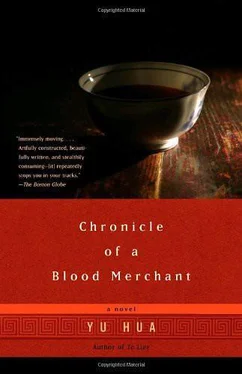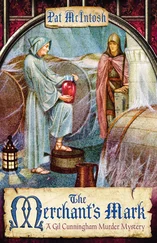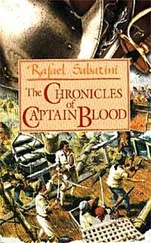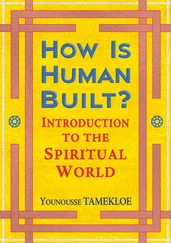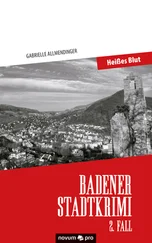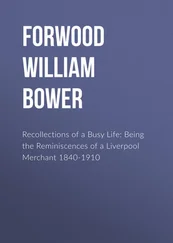People who knew him called out as he walked past, “Xu Sanguan, Xu Sanguan, Xu Sanguan, Xu Sanguan, Xu Sanguan, why are you crying? Why won’t you say anything? Why won’t you listen to us? Why are you walking in circles? What’s the matter with you?”
Someone said to Yile, “Xu Yile, quick! Look! Your dad’s crying and walking through the streets.”
Someone said to Erle, “Xu Erle, there’s an old man crying in the street. Lots of people are gathering around to watch. You’d better have a look. Isn’t that your dad?”
Someone said to Sanle, “Xu Sanle, your dad’s crying on the street. He’s crying so hard it looks like someone must have died.”
Someone went and told Xu Yulan, “Xu Yulan, what are you doing? Still cooking? Drop everything! Come right away. Your old man Xu Sanguan’s crying in the streets. We tried to talk to him, but he wouldn’t even look at us, and we asked him what was the matter, but he wouldn’t tell us anything. We don’t know what’s going on. Come quick!”
Yile, Erle, and Sanle ran out into the street and stood in their father’s way just as he was about to cross Five Star Bridge.
“Dad, what are you crying for? Who’s been upsetting you? Tell us what’s going on.”
Xu Sanguan leaned back against the railing of the bridge and sobbed, “I’m old. No one wants my blood anymore. The only one who might be able to use it is the lacquer man.”
His sons said, “Dad, what are you talking about?”
Xu Sanguan continued along his earlier train of thought. “What will happen if we run into trouble again? How will we manage?”
“What are you trying to say?”
Xu Yulan arrived just at this moment, grabbed hold of Xu Sanguan’s sleeves, and said, “What’s the matter with you? You were just fine when you went out, and now you’re crying like a baby.”
When Xu Sanguan saw that Xu Yulan had arrived, he lifted his head and wiped away his tears. “Xu Yulan, I’m an old man now. I’ll never be able to sell blood again. No one wants my blood anymore. What’ll happen to us if something goes wrong?”
Xu Yulan said, “Xu Sanguan, you don’t have to sell your blood anymore. We have enough money, and that’s not going to change. What do you need to sell your blood for? And why did you go to sell blood today anyway?”
Xu Sanguan said, “I wanted to eat a plate of fried pork livers. I wanted to drink two shots of yellow rice wine. I thought I could eat pork livers and drink wine if I sold some blood.”
Yile said, “Dad, don’t cry out here in the street. If you want to eat some fried pork livers and drink yellow rice wine, I’ll give you the money. Just don’t cry out here. If you cry in public, people will think we don’t treat you right.”
Erle said, “Dad, are you telling me that you’ve been making a scene all afternoon over some stupid pork livers and wine? And for that you’ve made us lose any face we might once have had?”
Sanle said, “Dad, don’t cry. If you really have to cry, why don’t you cry at home? Don’t cry out here. It just doesn’t look right.”
Xu Yulan wheeled around toward her three sons, and with her finger jabbing the air for emphasis, she shouted:
“What is with you three? Have your consciences been eaten by dogs? How can you talk that way about your dad? It was all for you. Each and every time he sold his blood was for you. Every fen he made selling blood he spent on you. You were raised on his blood. During the famine, when all we could get to eat was corn flour gruel and you three were nothing but skin and bones, he sold blood just so that you could eat some noodles. You three seem to have forgotten all about that. Then there was the time Erle was sent to work in the countryside. Your dad sold blood not once but twice. And all of that just so he could get on Erle’s brigade chief’s good side. Your dad treated him to lavish meals, bought him all kinds of gifts, just so you could get sent back home a little earlier. But you don’t remember any of that, do you, Erle? And Yile, what you just said hurts the most of all. How could you, of all people, talk to your dad that way? You’ve always been his favorite son. And he’s not even your real dad. Even so, he’s always been so good to you. When you had to go to the hospital in Shanghai, he sold blood everywhere he could along the way, because we didn’t have any money for the hospital bill. You’re supposed to wait at least three months each time you sell blood, but to save your life, your dad put his own life in danger. He sold blood after three days, then sold it again five days later. And he almost died in Pine Grove because of it. But you seem to have forgotten about that. What is with you three? I really think your consciences must have been eaten by dogs.”
As Xu Yulan’s voice faded to a whisper, tears slid down her face as well. She took hold of Xu Sanguan’s hand.
“Xu Sanguan, let’s go. Let’s go eat fried pork livers and drink yellow rice wine. We’ve got plenty of money now.” She fumbled in her pocket and extracted a wad of bills. “Look, these two are five- yuan bills, and here’s a two- yuan note, and here’s another one. And there’s more where that came from. You can eat whatever you want.”
Xu Sanguan said, “All I want is fried pork livers and yellow rice wine.”
Xu Yulan brought him to the Victory Restaurant, sat him down at a table, and ordered a plate of fried pork livers and two shots of yellow rice wine. When she was finished ordering, she picked up the menu and showed it to Xu Sanguan.
“There are a lot of other dishes here too. All of them are really good. Which ones do you want to try? Just tell me.”
“All I want is pork livers and rice wine.”
Xu Yulan ordered a second plate of fried pork livers for him, and then a third, accompanied by a whole bottle of yellow rice wine. When everything had been delivered to their table, she asked him once again what else he would like to eat. This time he shook his head.
“That’s enough. Any more dishes and I really wouldn’t be able to finish the meal.”
The table in front of Xu Sanguan was laden with three plates of fried pork livers, a bottle of yellow rice wine, as well as four extra shots of rice wine. He laughed as he ate the pork livers and drank the wine and said to Xu Yulan, “This is the best meal of my whole life.”
He laughed as he remembered what the young blood chief had said to him in the hospital. As he ate, he related to Xu Yulan exactly what he had said.
When Xu Yulan had heard his story, she began to curse. “ His blood is the pig’s blood, not yours! Not even the lacquer man would want his blood. Only a ditch or a drainage pipe could use his blood. Who does he think he is? I know who he is! He’s that idiot Shen’s kid. His dad’s an idiot. The man’s so stupid, he can’t even tell the difference between one yuan and five. And I know who his mom is too. She’s a real slut. Who knows whose bastard that Shen really is! Why, he’s even younger than Sanle, and yet he dares to talk like that to you! Back when we had Sanle, this Shen wasn’t even a twinkling in his mother’s eye, and now he thinks he’s on top of the world.”
Xu Sanguan said to Xu Yulan, “That’s why people say pubic hair doesn’t come out till after your eyebrows do, but gets even longer in the end.”
The extent to which Yu Hua — perhaps the most notorious agent provocateur of the Chinese literary avant-garde that flourished in the years around the Tiananmen movement of 1989—has become part of the mainstream was brought home to me on a recent visit to Beijing. Flipping through the cable TV channels, I suddenly stumbled across an “Arts and Entertainment”—style documentary featuring Yu Hua’s life and work. Replete with impressionistic black-and-white televisual reenactments of episodes from his youth in Haiyan, a small provincial city on China’s prosperous southeastern seaboard, the show narrates Yu Hua’s meteoric rise from “barefoot” dentist to fame as one of the very best-selling and most critically acclaimed figures in the Chinese literary establishment through a series of vignettes. We are shown his birth in 1960, the travails of a childhood spent amid the all-encompassing political chaos of the Cultural Revolution, his formative and easy familiarity with the funereal world of the hospital morgue where both his parents worked as doctors, the five years he spent pulling teeth by day and obsessively reading the masterpieces of modern literature by night, and, finally, the triumphal moment when one of his first short stories, sent unsolicited to a literary magazine in the far-off capital city of Beijing, elicited the phone call from an influential editor that would eventually catapult him to the forefront of the literary scene, and make him a major figure in the post-Mao transformation of China’s literary and cultural terrain.
Читать дальше
